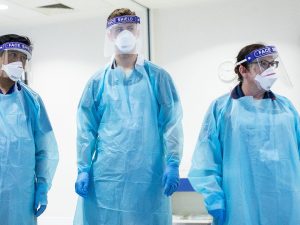
Almost half of doctors in England might be buying their own protective equipment or are relying on donations, according to a survey by the British Medical Association (BMA).
The survey of more than 16,000 doctors also found that 65% feel they are only partly or not at all protected on the front line of the coronavirus crisis.
One said the situation is “an outrage for all staff”.
The government said it is “working round the clock” to deliver equipment.
The survey found that 48% of doctors reported having bought personal protective equipment (PPE) directly for themselves or their department, or had received donations from a charity or local firm.
speaking on BBC Breakfast Dr Chaand Nagpaul, chairman of the BMA council said: “At the moment we’re at the mercy of donations or purchasing them,”
“That doesn’t give you security and it hasn’t met the government’s own commitment and promise that it will be protecting its workforce.”
He said the survey showed supplies were improving but that they had not reached a point where all staff could be assured they would be adequately protected from infection.
GPs appear to be more affected by PPE shortages: 55% of family doctors said they had to source their own equipment, compared with 38% of hospital doctors.
Dr Nagpaul said his own GP practice had received no eye protection from the NHS and was using equipment donated by a local school and business.
“When those run out, I don’t know where we’re getting the next supplies from,” he said.
Almost a third of doctors told the survey that they had not spoken out about PPE, staff shortages, testing or drug shortages because they did not think any action would be taken if they did.
In a statement, the government said it was “working around the clock to ensure PPE is delivered” to healthcare staff and said that it had supplied more than a billion items since the outbreak began.
Ensuring adequate protective equipment would be needed before lockdown restrictions are eased, the BMA said, as it will mean resuming normal NHS services, with greater numbers of non-coronavirus patients.